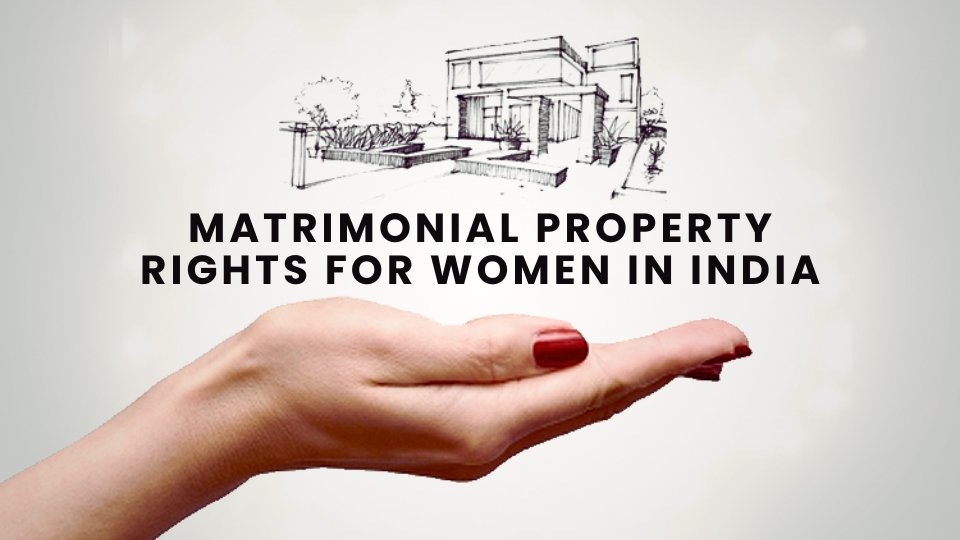Matrimonial Property Rights for Women in India: Understanding Legal Protections and Asset Division After Divorce
India has come a long way in its pursuit of gender equality, but there are still many areas where women are fighting for fairness. One such area is matrimonial property rights, which are essential for ensuring women’s financial security within a marriage. Understanding these rights helps women protect their share of the property accumulated during the marriage. This article provides an overview of matrimonial property rights for women in India and the legal framework surrounding them.
Defining Matrimonial Property

What Is Matrimonial Property?
The matrimonial property includes any asset acquired by either spouse during their marriage. This may involve real estate, bank accounts, investments, and even gifts received during the marriage. Recognizing matrimonial property ensures that both spouses benefit fairly from the wealth they have helped build throughout their relationship.
Categories of Matrimonial Property:
- Jointly Owned Property: This refers to assets purchased together by both spouses, such as a family home.
- Individually Owned Property: These are assets owned by either spouse before marriage or acquired independently during the marriage, such as through inheritance or personal gifts.
Matrimonial Property Rights for Indian Women
The Hindu Marriage Act, 1955
This Act regulates marriage and divorce for Hindus, Buddhists, Jains, and Sikhs. However, it does not provide specific rules on the division of matrimonial property in the event of divorce. Property distribution is typically based on mutual consent or settled by the courts if no agreement is reached.
The Special Marriage Act, 1954
This Act governs marriages between individuals of different religions and, like the Hindu Marriage Act, it lacks explicit provisions on matrimonial property rights. When couples divorce under this Act, the division of property usually relies on mutual agreement or, if necessary, court intervention.
The Protection of Women from Domestic Violence Act, 2005
While not specifically focused on property, this Act indirectly addresses the issue by granting women the right to reside in their matrimonial home. This ensures some degree of protection but does not clearly define property division.
How Property Is Divided Upon Divorce

In India, the division of matrimonial property following divorce is largely dependent on mutual agreements between spouses. When no agreement can be reached, the courts decide on an equitable division. Courts consider various factors when determining how to divide property, including the non-monetary contributions of the wife, such as her role in managing the household or raising children.
Streedhan: A Woman’s Exclusive Right
Streedhan refers to property or gifts a woman receives during her marriage, including jewelry, cash, and other valuable items gifted by her family, husband, or in-laws. Unlike other matrimonial property, Streedhan is considered exclusively the woman’s, and she has full control over it. Even after divorce, Streedhan remains her personal property.
Common Challenges Faced by Women in Asserting Their Rights
Despite the legal framework intended to protect women’s property rights, many women face difficulties in claiming their entitlements. Some common barriers include:
- Lack of Legal Awareness: Many women are unaware of their legal rights, particularly when it comes to matrimonial property.
- Social and Cultural Norms: Traditional views on gender roles often discourage women from asserting their property rights, especially after divorce.
- Complex Legal Procedures: Navigating the legal system can be complicated, leading to delays or difficulties in claiming a fair share of the property.
How to Empower Women
Education and Awareness
Educating women about their legal rights is crucial for empowering them to claim what they are entitled to. Awareness campaigns, legal workshops, and community programs can help bridge the knowledge gap and ensure women are better informed about their rights.
Seeking Legal Counsel
For women facing legal hurdles in asserting their matrimonial property rights, seeking help from a family law expert is critical. A knowledgeable lawyer can guide them through the legal system and help ensure their rights are fully recognized and protected.
Conclusion
Matrimonial property rights represent much more than financial entitlements; they symbolize equality and respect for women within a marriage. While India’s legal framework offers some protection, societal change and individual awareness are essential to ensure women can fully claim these rights. As the country progresses, it is vital that we continue working towards a society where women can assert their rights without facing unnecessary obstacles.
Frequently Asked Questions About Matrimonial Property Rights for Women in India
Q1. What constitutes matrimonial property?
Answer: Matrimonial property includes any assets or wealth accumulated by either spouse during the marriage, ranging from real estate to financial investments.
Q2. Are women entitled to a share of their husband’s property?
Answer: Yes, women are entitled to a share in the matrimonial property acquired during the marriage. However, the exact share is often decided through mutual agreement or by the court in case of dispute.
Q3. What is Streedhan, and does it belong solely to the wife?
Answer: Streedhan includes gifts and property given to a woman during her marriage, and it is her exclusive property, over which she has complete control.
Q4. Can a wife claim her husband’s property after divorce?
Answer: Yes, a wife can claim a share of the matrimonial property after divorce, depending on her contributions to the marriage. The distribution is either agreed upon mutually or decided by the court.
Q5. How is matrimonial property divided in the case of divorce in India?
Answer: Property division is typically decided by mutual consent. If an agreement is not possible, the court steps in and considers various factors, including the wife’s non-monetary contributions to the marriage.



